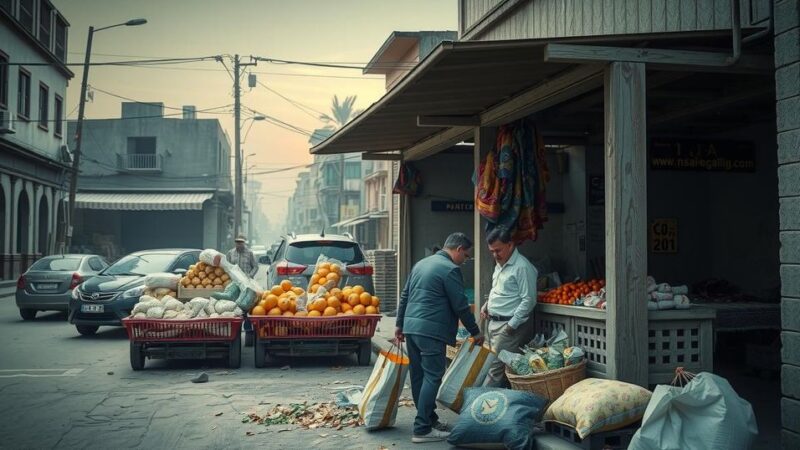European Union leaders respond to Trump’s paused tariffs on Mexico and Canada, stressing a commitment to constructive dialogue while preparing for potential retaliation. Federal Reserve officials warn of inflation risks linked to trade tariffs. The pause comes as South Africa’s AIDS treatment programs face funding uncertainties. Legal challenges to the funding freeze highlight contentious government policies, with Canada investing in border security as the situation evolves.
On Monday, European Union leaders addressed US President Donald Trump’s plans to impose tariffs on imports from Mexico and Canada. While expressing a preference for constructive dialogue, EU officials, led by European Commission President Ursula von der Leyen, affirmed their readiness to respond decisively if unfairly targeted. This pause on tariffs provides a temporary relief amid growing concerns over inflation risks associated with such trade measures, as highlighted by three Federal Reserve officials.
Federal Reserve Bank of Boston President Susan Collins pointed out that broad-based tariffs could lead to price increases not only on final goods but also on intermediate goods. President of the Federal Reserve Bank of Chicago, Austan Goolsbee, emphasized the need for caution regarding interest-rate cuts due to the uncertain impacts of tariffs on inflation. Raphael Bostic, president of the Federal Reserve Bank of Atlanta, noted that businesses are preparing to pass rising costs from tariffs to consumers, signaling potential inflationary pressures.
Analysts at the Peterson Institute for International Economics estimate that full implementation of the proposed tariffs would cost the average American household an additional $1,200 annually. Meanwhile, South Africa’s Health Minister Aaron Motsoaledi has criticized the Trump administration’s freeze of foreign aid, particularly affecting the US-funded AIDS treatment programs, which fund nearly 20% of South Africa’s HIV/AIDS programs. These funding constraints cause significant disruptions at facilities supported by the US President’s Emergency Plan for AIDS Relief (PEPFAR), impacting approximately 20 million people globally.
In the legal sphere, US District of Columbia Judge Loren L AliKhan extended a temporary order against the planned funding freeze following lawsuits challenging the administration’s policies. Some nonprofit organizations have reportedly accessed federal funding despite the administration’s rollback. Two judges, including one in Rhode Island, have issued blocks on the proposed funding restrictions, underscoring the contentious legal landscape surrounding these decisions.
In response to the evolving situation, Canada has committed to enhancing border security by investing approximately 1.3 billion Canadian dollars (around 750 million US dollars) in new technologies to deter illegal immigration and trafficking. Given that a minuscule fraction of illicit drugs enter the US from Canada, the effectiveness of these measures remains debatable. Most recently, Trump has suspended tariffs on both Mexico and Canada for a month, signaling a temporary truce in what a US financial publication termed “the dumbest trade war in history.”
Furthermore, US Secretary of State Marco Rubio concluded his visit to Panama by overseeing deportations of undocumented migrants and reinforcing regional cooperation to control migration flows. While Panama has offered to facilitate US deportations with civilian-run operations at a small airport, President Jose Raul Mulino remains cautious regarding potential implications related to Chinese influence near the Panama Canal. Regular updates on these developments can be followed for ongoing coverage of this dynamic situation.
The article explores the recent developments regarding US tariffs on imports from Mexico and Canada, emphasizing the implications for inflation and international relations. It highlights the perspectives of various Federal Reserve officials and the impact of US foreign aid freezes on global health programs, particularly addressing the concerns from South Africa regarding AIDS treatment facilities. Additionally, it discusses legal battles surrounding funding freezes and efforts made by Canada to bolster border security. All of these factors contribute to a complex narrative surrounding trade, health, and immigration policy during the Trump administration.
In conclusion, the temporary pause on tariffs against Mexico and Canada reflects a careful navigation of trade relations amid inflation concerns voiced by Federal Reserve officials. The Trump administration’s foreign aid freeze raises serious implications for public health initiatives, particularly in South Africa. As legal challenges unfold, and Canada enhances its border security measures, the unfolding scenario necessitates ongoing scrutiny and dialogue to ensure fair and effective policy outcomes. Emphasizing regional cooperation may be crucial as the US addresses these multifaceted challenges.
Original Source: www.aljazeera.com






